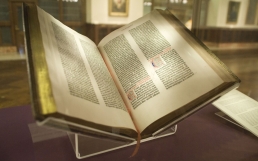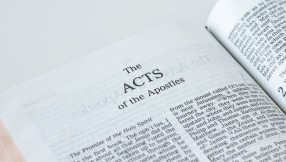
Scientists at New York University and Johns Hopkins University are causing a stir with a new research project. They're recruiting ministers to take psilocybin, the active ingredient in so-called 'magic mushrooms', to see how it affects their faith. They want to find out whether there are similarities between drug-induced mystical states and those induced by meditation or other religious practices.
They want ministers to take drugs?
It's all legal. It's for Science. And actually they're having trouble recruiting them; they want a dozen and only one's signed up so far.
And what are they hoping to find out?
Users of mind-altering drugs have always reported ecstatic experiences in which they felt they were at one with the Universe. They have had an intense awareness of beauty and a sense of connectedness which they have struggled to articulate. The researchers want to know whether this continues into their pastoral ministry.
What, like they're in a building committee meeting contemplating the beauty of a rose?
Research leader Roland Griffiths said: "What I would most hope to see is that this kind of experience would resonate with the reasons they were initially drawn into the ministry and empower them to engage with their congregation in renewed and exciting ways."
Hang on, though. What's the difference between being blissed-out through magic mushrooms and blissed-out in a worship service? I'm not sure I like where this is heading.

Some people worry about the implications of research like this for Christian belief. Drugs are one way of replicating mystical experiences. Another is the use of electromagnetic fields that work on the brain's temporal lobes, which are responsible for hallucinations. Richard Dawkins, the noted atheist campaigner, volunteered for an experiment in 2003 using a special helmet designed by Dr Michael Persinger. Could the helmet make him experience the same feelings as religious mystics? No, as it happened, though it worked on other subjects.
So Christians who claim to have seen angels or had intense experiences of God just have something chemical or electrical going on?
The operative word there is "just". Everything we think or feel has a physical basis at some level; that's just how we work. If you could measure the brain of a Christian mystic in a trance, you'd see the same sort of activity. So what?
But this might say something about mysticism, though.
It might indeed. The Church has always been a bit wary of people who see visions and have ecstatic experiences, though of course realising that they are often genuine. Paul was one, after all (2 Corinthians 12: 1-10). On the other hand, the great Cardinal Newman – now a saint, bless him – said that mysticism "begins in mist and ends in schism". These experiences are personal blessings, but they are not a good basis for doctrinal statements and they are not what religion's all about.
That's a relief. To be honest, I've never had one.
Quite; most people haven't, and it doesn't stop them being faithful Christians. And the point is that we test every experience, mystical or not, by what we believe to be true. We should be open to having our minds expanded and radically changed, but not to cutting loose from the Bible and the Church in favour of our private judgment.
I know a joke about mysticism.
Oh, go on, then.
A mystic goes into a Subway and says to the assistant, "Can you make me one with everything?"
I knew I'd regret it.
Follow @RevMarkWoods on Twitter.

















